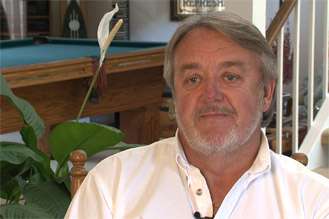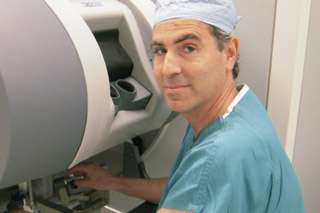Prostate Cancer Robotic Surgery
Find your care
We deliver customized urology care based on your unique needs. To learn more or connect with a urology specialist, call 310-794-7700.
Prostate Surgery at UCLA
Barry Broughton - Dr. Robert Reiter Patient Story
Robotic Prostate Surgery at UCLA
Barry Broughton is a successful marketing executive who has traveled the world and faced a lifetime of challenges. But few challenges would be as difficult as the diagnosis he received last year of prostate cancer.

Barry's cancer was diagnosed following a test called a PSA, or prostate-specific antigen test, which measures a protein produced by the prostate that is elevated in most men with prostate cancer. A rising PSA indicates the likelihood of a growing cancer, and the faster it rises, the more aggressive the cancer is likely to be.
Prostate cancer is one of the most-common cancers affecting men. Each year, 220,000 new cases are diagnosed and 29,000 men die from the disease. But that number is down from 40,000 deaths 10 years ago, potentially because of the kind of screening that Barry received.

Barry and his physician, UCLA urologist Dr. Robert Reiter, director of the Prostate Cancer Treatment Program at UCLA, talked about his options for prostate cancer treatment, including radiation and different types of surgery. After much discussion, both Barry and Dr. Reiter felt that prostate surgery, using the latest in robotic technology, to remove his cancerous prostate would be Barry's best choice.
The technique is minimally invasive, meaning it is performed through small holes in the abdomen through which a camera and instruments are inserted. The instruments have wrist-like joints and can move in all directions, giving the surgeon maximum flexibility and accuracy of movement.
In addition, the camera provides three-dimensional images, offering the surgeon an improved visual field as he works the instruments. And because a long incision is not necessary, there is much less blood loss and patients generally experience less pain and faster recovery, often returning home the next day and back to most activities within a few weeks.
The efficacy of the prostate surgery is further enhanced at UCLA by the integration of magnetic resonance imaging, which reduces the risks of leaving cancer behind and improves the chances of sexual recovery.
After his prostate surgery, Barry was up and walking the next day. He quickly regained urinary and sexual function, and, most important to him and his family, Barry is now cancer free.
Our Prostate Cancer Mission is You



Patient Stories
The UCLA Department of Urology provides treatment for urological conditions of all kinds and is committed to providing the highest quality of patient care. We take great pride in being able to share a few of our patients' stories with you.
Meet Our Doctors
The Department of Urology at UCLA is one of the most progressive and comprehensive urology programs in the country. Our faculty members work side by side with research scientists for new cures and treatments for prostate cancer.
Make An Appointment
Our goal is to provide you with fast, easy access to the physicians and services at UCLA. For assistance in determining which UCLA urologist(s) may have expertise to help you, please call the Urology Appointment phone number:
(310) 794-7700